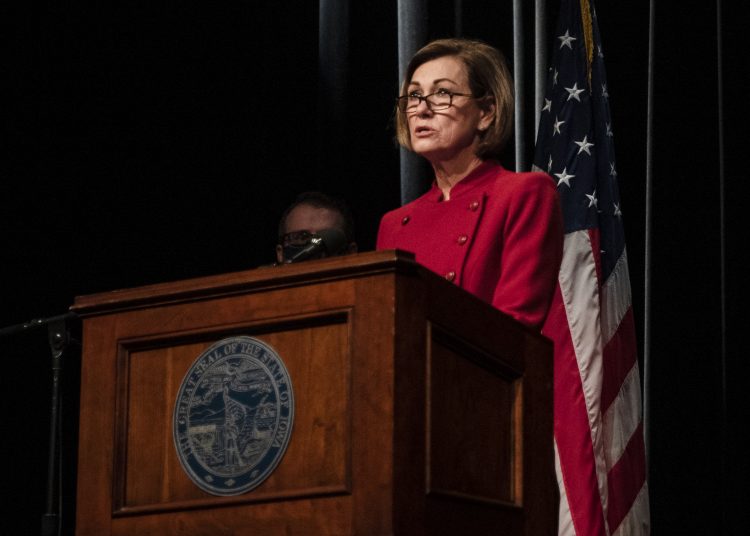(The Center Square) Gov. Kim Reynolds dropped COVID-19-related mandates and enforcement on Iowa businesses from Feb. 7 through March 7 in a Feb. 5 proclamation while recommending continued adherence to Iowa Department of Public Health guidance.
The proclamation states, “I strongly encourage that all businesses or other employers remaining open with in-person operations take reasonable measures under the circumstances of each establishment to ensure the health of employees, patrons, and members of the public, including social distancing practices, increased hygiene practices, and other public health measures to reduce the risk of transmission of COVID-19 consistent with guidance issued by the Iowa Department of Public Health” and that “This section shall not be a basis for closing or taking enforcement action against a business or other employer absent an additional specific order or directive of the Iowa Department of Public Health.”
The mandates regarding restaurants that expired with the change included the limitation of party sizes to eight people unless they were all from the same household, requiring 6 feet of social distancing between parties and that both customers who were not seated and restaurant staff interacting with customers had to wear masks.
“They’re asking businesses to stay responsible, so I think the net result is going to be that there aren’t going to be big changes overnight in most restaurants and bars,” Iowa Restaurant Association President and CEO Jessica Dunker told The Center Square in a phone interview. “I think they will slowly – knowing that they can comfortably accommodate people – they might expand how many people they can have come in, but they want to do it safely. They probably will keep their staff in masks. But what will be simpler is not being put in a position to have to police your customers.”
Standing by the bar or playing pool while drinking beer weren’t permitted under the restrictions and presented enforcement challenges, for example, she said.
Dunker said the restaurant industry has suffered substantially during the pandemic, as revenue has fallen an average of 33% for the industry and some restaurants have experienced a drop of 50% to 60% in sales. Steps “normalizing the expectation” that restaurants are safe will help the industry, she said.
“I think generally the loosening of restrictions is good for restaurants and bars because it puts the power back into the hands of the owners to choose how to most effectively keep people safe,” she said.
Restaurant managers might include their COVID-19 safety decisions as a marketing strategy, appealing to customers who want certain levels of protection or looser restrictions, she said.
“A restaurant can talk about their own mitigation steps and the things that they’re not mandated to do, but that they’re choosing to do, as a differentiator over another restaurant,” Dunker said.
Restaurants have longstanding food safety precautions in place to protect customers from norovirus and foodborne illnesses, and every Iowa restaurant has a certified food protection manager who is responsible for ensuring food safety and a sanitized environment for customers, she added.
“We always had a great deal of faith in ourselves that we could keep people safe, and long after COVID is gone, we’ll still be doing that because we will still have certified food protection managers in every single establishment in Iowa,” Dunker said.
In the past 14 days, 8.9% of the nearly 1.5 million Iowans tested for COVID-19 have tested positive, according to data from the Iowa Department of Public Health. The department also confirmed on February 1 that there were three cases of COVID-19 variant SARS-CoV-2 B.1.1.7.
As of 5 p.m on Tuesday, 9, 95,642 individuals had completed their second dose of the COVID-19 vaccine and 173,358 individuals had completed their first vaccine dose, according to Iowa’s COVID-19 Vaccine information page. Iowa COVID-19 related deaths numbered 5,145 as of 5:00 p.m. on Tuesday, including 4,650 deaths with COVID-19 as the underlying cause and 495 deaths with it as a contributing factor, according to data from the department.
The Governor’s office did not respond to inquiries by press time.
















